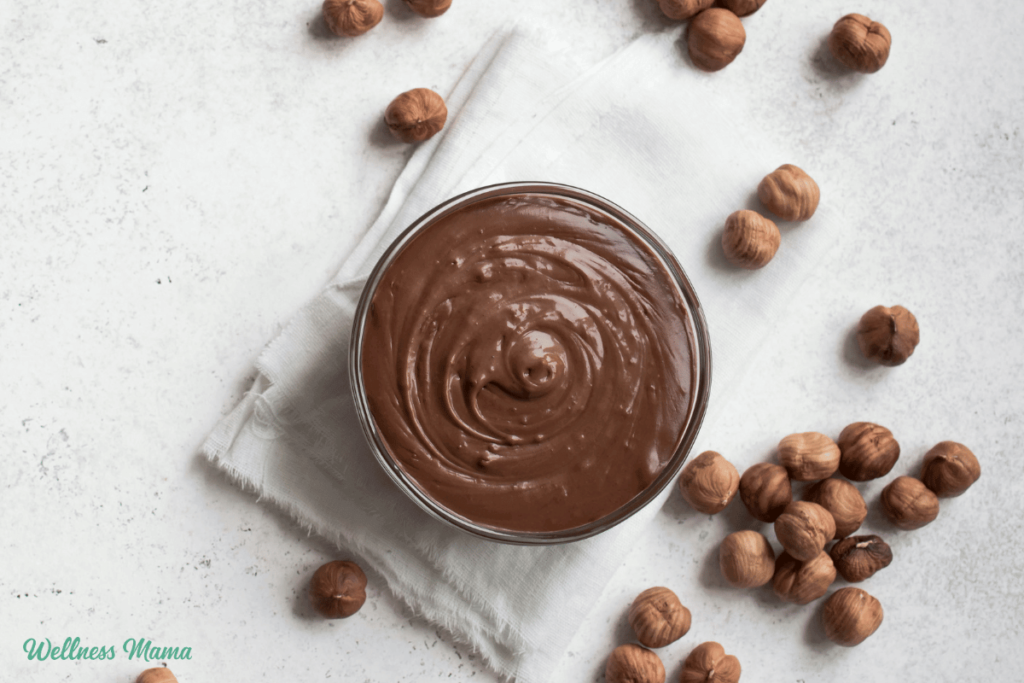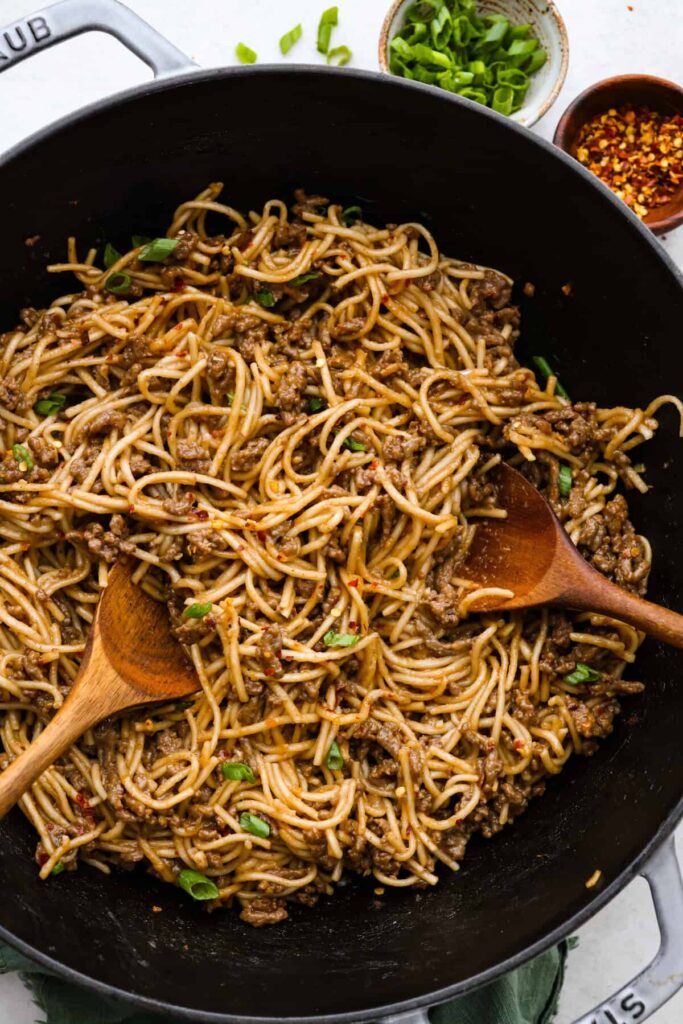Many years ago, I spent a few weeks vacationing in Europe. I hiked, explored beautiful towns, tried local foods, and indulged in way too much of an Italian favorite: Nutella. I’d eat Nutella for breakfast and dessert, and it was a delicious, chocolatey treat.
When I got home, I’d occasionally buy a jar of Nutella to enjoy. But I wondered, is Nutella healthy? As I learned more about the ingredients, I realized it wasn’t a good option. I created my own recipe for homemade Nutella, but that often takes more time than I have.
I was determined to find a healthier, pre-made, lower-sugar version of this spread.
What is Nutella?
Chocolate hazelnut spread has been popular since the early 1800s when chocolate was scarce because of import laws. To stretch the chocolate they did have, chocolatiers started adding hazelnuts, which were abundant, to create a spreadable treat. They called it gianduia, and it maintained popularity through the years.
During WWII, chocolate availability was again impacted by rationing. Pietro Ferrero, a chocolatier in Italy, revived the idea of adding hazelnuts to stretch chocolate. Thus, Nutella was born. Today, the spread is still very popular in Europe and the US.
Unfortunately, the American version contains a high amount of sugar and questionable ingredients. While it was marketed as a healthy breakfast food, due to its high sugar content, I’d lump it in with donuts and pastries.
Is Nutella Healthy?
Based on the commercials, you may think Nutella is a health food worthy of a place on your breakfast (and lunch and dinner) table. It doesn’t contain many ingredients, and they all seem somewhat harmless. Unfortunately, those simple ingredients are hiding some problems:
Nutella Ingredients: sugar, palm oil, hazelnuts, cocoa, skim milk powder, whey powder, soy lecithin, and vanillin
Seems like simple and relatively healthy ingredients, right? At least we can pronounce them all! Heck, even a 5-year-old could probably pronounce all of those ingredients. However, digging a little deeper into the ingredients shows hidden problems with this spread.
Nutella Ingredients
Unfortunately, several ingredients disqualify Nutella from health food status. It doesn’t have any nutritional value or health benefits. In fact, the amount of added sugar and artificial flavors means it’s something to avoid. If you wouldn’t eat a candy bar for breakfast or feed one to your child, then skipping Nutella is probably a good idea, too.
Sugar
The first ingredient is refined sugar… and not a small amount. Two tablespoons of this chocolatey spread contains 21 grams of sugar or five cubes of added sugar! That’s more than most candy bars and donuts!
To make matters worse, the sugar is not organic. Nutella mainly uses sugar from beets, a highly refined sugar often containing large amounts of pesticides. Sugar beets are also often GMOs. Hardly a health food.
There’s a time and a place for sugar consumption (in moderation, of course). But it’s important to choose organic and non-GMO sugar.
Palm Oil
Palm oil is a healthy fat that’s common in many things, including food, detergents, and beauty products. This oil grows in the tropics (mostly Southeast Asia) and is often harvested unsustainably. This contributes to deforestation, habitat destruction, water pollution, and human rights offenses.
Thankfully, not all palm oil harvesting harms the environment. If properly sourced, it can be a very nutritious ingredient. Palm Done Right works to raise awareness about properly sourced palm oil and encourages consumers to choose ethical and healthier options. Nutella uses 100% certified sustainable palm oil that’s RSPO certified (one of the few good things about it).
Soy Lecithin
Another controversial ingredient in this spread is soy. Unless it comes from an organic source, soy is a highly sprayed crop (often GMO). It’s processed with hexane, a harsh solvent and gasoline byproduct. Soy also contains xenoestrogens, which are potent endocrine disruptors. Many experts think that these xenoestrogens may be partially to blame for rising rates of reproductive issues.
While it’s hard to completely avoid soy lecithin, there are healthier alternatives. For example, sunflower seeds don’t have the same problems.
Commercial Dairy
Nutella also contains non-organic “skimmed milk powder.” Don’t get me wrong, I have no problem with ethically sourced dairy, but that’s not what you’ll find in Nutella.
Commercially sourced dairy comes from cows raised in terrible conditions and fed GMO grains and antibiotics. It’s also pasteurized and homogenized. By the time it becomes “milk powder,” it’s full of oxidized cholesterol, which forms during dehydration. This is one of the most harmful types of cholesterol.
Hazelnuts
Hazelnuts are a wonderful and nutritious food that originated near the Black Sea. Unfortunately, many modern hazelnuts grown in the US and Canada are sprayed with commercial pesticides. Always choose organic hazelnuts to avoid pesticide contamination.
Cocoa Powder
Cocoa is another nutritious food that has a place in a healthy diet. It’s got antioxidants, which are good for heart health. Unfortunately, much of the world’s supply is harvested in unethical ways, including child slave labor. It’s ironic and sad that forced child labor and slavery produce the treats we love.
According to an investigation by the BBC, these child slaves work 80 to 100 hours a week without pay. They’re underfed, don’t receive education, and most will never see their families. An estimated 1.8 million children work in the cocoa fields in Ghana and the Ivory Coast.
No matter how good something is for my health, I refuse to buy or consume any product that comes from children forced into slavery and inhumane conditions. Thankfully Nutella uses cocoa produced without child labor and supports healthy cocoa production.
Vanillin
It would be easy to glance over this ingredient and assume it’s just a technical name for real vanilla… but it isn’t. Real vanilla extract is essentially a tincture made from vanilla beans (here’s how to make it). It has a wonderful flavor and even contains some B vitamins.
Vanillin isn’t so wholesome. It’s an artificial vanilla flavor combined with sugar or corn syrup. In stores, labels sometimes list it as “imitation vanilla.” It’s often derived from things like wood pulp… hardly what I want in my food!
Nutella: Health Washing?
You aren’t alone if you’ve thought Nutella was healthy (even though it isn’t). A 2012 lawsuit convicted Nutella’s parent company, Ferrero USA, of making misleading health claims in its advertising and packaging.
The result was a $3 million settlement. The company was forced to reimburse consumers who had bought it, thinking it was healthy. It also required Ferrero USA to change its packaging, website, and marketing to reflect the high sugar content.
Is There a Healthy Nutella?
I know you might be thinking, Nutella is so delicious. Can’t we enjoy it in moderation?
And normally, I’d say yes, we can enjoy things in moderation. But when it comes to a blend of refined, highly processed ingredients, I just can’t get on board with that.
I created a homemade Nutella recipe that I make in the food processor. But I don’t always have the time to make it. It’s great to have a healthier store-bought option. Thankfully, I found Nutiva’s Organic Hazelnut Spread — a healthy alternative.
A Healthy Alternative to Nutella
Nutiva’s organic, non-GMO verified, dairy-free, gluten-free spread has all the deliciousness of Nutella without the harmful junk. My kids enjoy this nostalgic treat in moderation!
Our family loves Nutiva’s spread because it’s:
- Much lower in sugar: It contains 40% less sugar than other options. The name brand contains 21 grams of sugar per serving size. Nutiva has only 12 grams.
- Ethically sourced: Most hazelnut spreads contain palm oil and cocoa, which can be problematic if not ethically sourced. All of Nutiva’s ingredients, including palm oil and cocoa, are ethically sourced (rainforest and animal-friendly).
- More nutritious: Unlike other brands, this one contains 450 mg of omega-3s per serving! (That’s more per serving than sardines and tuna contain… and my kids certainly prefer the chocolate!)
- Organic, non-GMO verified, and certified gluten-free: Other brands aren’t organic and contain ingredients that may be genetically modified.
- Dairy-free: We aren’t vegan, but I prefer a dairy-free alternative when the dairy source is commercial dairy.
Delicious Ways to Eat Hazelnut Spread
Whether you make your own Nutella or save time and money and buy the organic pre-made version, there are so many delicious ways to eat this spread:
- Dip for banana chips: My kids love dipping banana chips into it.
- In a smoothie: They’ve found creative ways to use it in smoothies. Their favorites are hazelnut butter and jelly smoothie and chocolate hazelnut banana smoothie.
- Topping for pancakes or waffles: My oldest likes to make pancakes for the family on Saturdays. The kids drizzle them with this spread and sliced strawberries.
- Mocha coffee: Try blending a teaspoon of chocolate hazelnut spread into coffee for a natural creamer.
- Nut butter substitute: Can’t have (or don’t love) peanut butter or other nut butter? Use delicious chocolate hazelnut spread in any recipe that calls for nut butter.
- Hot chocolate: This recipe is one of the easiest ways to make a delicious, creamy hot chocolate.
- Drizzle over ice cream: Warm up some spread and drizzle it over ice cream for a delicious treat!
Swapping Out Your Nutella
Switching to a healthier version of Nutella allows you to still enjoy this delicious treat without all the added sugar, artificial flavors, and questionable ingredients. I’d still recommend enjoying it in moderation. But with a healthier version, at least you’ll be enjoying something that’s got more nutritional value and less sugar!
You can get Nutiva Chocolate Hazelnut Spread here. There are some other healthy options on the market now too. I also like this one from Artisana Organics which features ethically sourced, sustainable ingredients. Plus it’s sweetened with coconut sugar.
Are you a Nutella fan? Will you switch to a better alternative?










5aoim4
zwke96